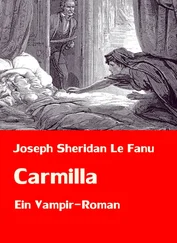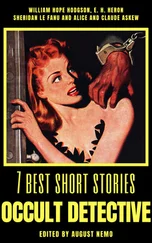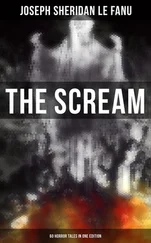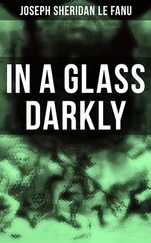Sheridan Le Fanu - The Haunted Baronet
Здесь есть возможность читать онлайн «Sheridan Le Fanu - The Haunted Baronet» — ознакомительный отрывок электронной книги совершенно бесплатно, а после прочтения отрывка купить полную версию. В некоторых случаях можно слушать аудио, скачать через торрент в формате fb2 и присутствует краткое содержание. Жанр: unrecognised, на английском языке. Описание произведения, (предисловие) а так же отзывы посетителей доступны на портале библиотеки ЛибКат.
- Название:The Haunted Baronet
- Автор:
- Жанр:
- Год:неизвестен
- ISBN:нет данных
- Рейтинг книги:5 / 5. Голосов: 1
-
Избранное:Добавить в избранное
- Отзывы:
-
Ваша оценка:
- 100
- 1
- 2
- 3
- 4
- 5
The Haunted Baronet: краткое содержание, описание и аннотация
Предлагаем к чтению аннотацию, описание, краткое содержание или предисловие (зависит от того, что написал сам автор книги «The Haunted Baronet»). Если вы не нашли необходимую информацию о книге — напишите в комментариях, мы постараемся отыскать её.
Joseph Thomas Sheridan Le Fanu (28 August 1814 – 7 February 1873) was an Irish writer of Gothic tales and mystery novels. He was the premier ghost story writer of the nineteenth century and had a seminal influence on the development of this genre in the Victorian era.
The Haunted Baronet — читать онлайн ознакомительный отрывок
Ниже представлен текст книги, разбитый по страницам. Система сохранения места последней прочитанной страницы, позволяет с удобством читать онлайн бесплатно книгу «The Haunted Baronet», без необходимости каждый раз заново искать на чём Вы остановились. Поставьте закладку, и сможете в любой момент перейти на страницу, на которой закончили чтение.
Интервал:
Закладка:
“Well said, Dick!” exclaimed Doctor Torvey; “I own to your conclusion; but there ain’t a soul here but ourselves — and we’re all friends, and you are your own master — and, hang it, you’ll tell us that story about the drowned woman, as you heard it from your father long ago.”
“Ay, do, and keep us to our liquor, my hearty!” cried the Captain.
Mr. Peers looked his entreaty; and deaf Mr. Hollar, having no interest in the petition, was at least a safe witness, and, with his pipe in his lips, a cozy piece of furniture.
Richard Turnbull had his punch beside him; he looked over his shoulder. The door was closed, the fire was cheery, and the punch was fragrant, and all friendly faces about him. So said he:
“Gentlemen, as you’re pleased to wish it, I don’t see no great harm in it; and at any rate, ’twill prevent mistakes. It is more than ninety years since. My father was but a boy then; and many a time I have heard him tell it in this very room.”
And looking into his glass he mused, and stirred his punch slowly.
Chapter 2. The Drowned Woman
“It ain’t much of a homminy,” said the host of the George. “I’ll not keep you long over it, gentlemen. There was a handsome young lady, Miss Mary Feltram o’ Cloostedd by name. She was the last o’ that family; and had gone very poor. There’s but the walls o’ the house left now; grass growing in the hall, and ivy over the gables; there’s no one livin’ has ever hard tell o’ smoke out o’ they chimblies. It stands on t’other side o’ the lake, on the level wi’ a deal o’ a’ad trees behint and aside it at the gap o’ the clough, under the pike o’ Maiden Fells. Ye may see it wi’ a spyin’-glass from the boatbield at Mardykes Hall.”
“I’ve been there fifty times,” said the Doctor.
“Well there was dealin’s betwixt the two families; and there’s good and bad in every family; but the Mardykes, in them days, was a wild lot. And when old Feltram o’ Cloostedd died, and the young lady his daughter was left a ward o’ Sir Jasper Mardykes — an ill day for her, poor lass! — twenty year older than her he was, an’ more; and nothin’ about him, they say, to make anyone like or love him, ill-faur’d and little and dow.”
“Dow — that’s gloomy,” Doctor Torvey instructed the Captain aside.
“But they do say, they has an old blud-stean ring in the family that has a charm in’t; and happen how it might, the poor lass fell in love wi’ him. Some said they was married. Some said it hang’d i’ the bell-ropes, and never had the priest’s blessing; but anyhow, married or no, there was talk enough amang the folk, and out o’ doors she would na budge. And there was two wee barns; and she prayed him hard to confess the marriage, poor thing! But t’was a bootlese bene, and he would not allow they should bear his name, but their mother’s; he was a hard man, and hed the bit in his teeth, and went his ain gait. And having tired of her, he took in his head to marry a lady of the Barnets, and it behoved him to be shut o’ her and her children; and so she nor them was seen no more at Mardykes Hall. And the eldest, a boy, was left in care of my grandfather’s father here in the George.”
“That queer Philip Feltram that’s travelling with Sir Bale so long is a descendant of his?” said the Doctor.
“Grandson,” observed Mr. Peers, removing his pipe for a moment; “and is the last of that stock.”
“Well, no one could tell where she had gone to. Some said to distant parts, some said to the madhouse, some one thing, some another; but neither she nor the barn was ever seen or spoke to by the folk at Mardykes in life again. There was one Mr. Wigram that lived in them times down at Moultry, and had sarved, like the Captain here, in the king’s navy in his day; and early of a morning down he comes to the town for a boat, sayin’ he was looking towards Snakes Island through his spyin’-glass, and he seen a woman about a hundred and fifty yards outside of it; the Captain here has heard the bearings right enough. From her hips upwards she was stark and straight out o’ the water, and a baby in her arms. Well, no one else could see it, nor he neither, when they went down to the boat. But next morning he saw the same thing, and the boatman saw it too; and they rowed for it, both pulling might and main; but after a mile or so they could see it no more, and gave over. The next that saw it was the vicar, I forget his name now — but he was up the lake to a funeral at Mortlock Church; and coming back with a bit of a sail up, just passin’ Snakes Island, what should they hear on a sudden but a wowl like a death-cry, shrill and bleak, as made the very blood hoot in their veins; and looking along the water not a hundred yards away, saw the same grizzled sight in the moonlight; so they turned the tiller, and came near enough to see her face — blea it was, and drenched wi’ water — and she was above the lake to her middle, stiff as a post, holdin’ the weeny barn out to them, and flyrin’ [smiling scornfully] on them as they drew nigh her. They were half-frighted, not knowing what to make of it; but passing as close as the boatman could bring her side, the vicar stretched over the gunwale to catch her, and she bent forward, pushing the dead bab forward; and as she did, on a sudden she gave a yelloch that scared them, and they saw her no more. ’Twas no livin’ woman, for she couldn’t rise that height above the water, as they well knew when they came to think; and knew it was a dobby they saw; and ye may be sure they didn’t spare prayer and blessin’, and went on their course straight before the wind; for neither would a-took the worth o’ all the Mardykes to look sich a freetin’ i’ the face again. ’Twas seen another time by market-folk crossin’ fra Gyllenstan in the self-same place; and Snakes Island got a bad neam, and none cared to go nar it after nightfall.”
“Do you know anything of that Feltram that has been with him abroad?” asked the Doctor.
“They say he’s no good at anything — a harmless mafflin; he was a long gaumless gawky when he went awa,” said Richard Turnbull. “The Feltrams and the Mardykes was sib, ye know; and that made what passed in the misfortune o’ that young lady spoken of all the harder; and this young man ye speak of is a grandson o’ the lad that was put here in care o’ my grandfather.”
Читать дальшеИнтервал:
Закладка:
Похожие книги на «The Haunted Baronet»
Представляем Вашему вниманию похожие книги на «The Haunted Baronet» списком для выбора. Мы отобрали схожую по названию и смыслу литературу в надежде предоставить читателям больше вариантов отыскать новые, интересные, ещё непрочитанные произведения.
Обсуждение, отзывы о книге «The Haunted Baronet» и просто собственные мнения читателей. Оставьте ваши комментарии, напишите, что Вы думаете о произведении, его смысле или главных героях. Укажите что конкретно понравилось, а что нет, и почему Вы так считаете.












